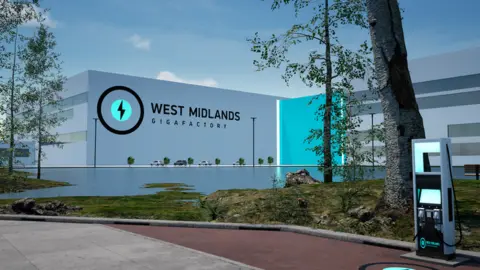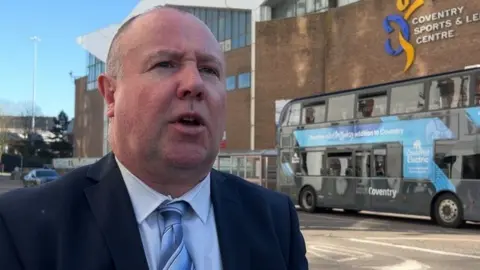Coventry £500k gigafactory outlay backed despite concerns
 West Midlands Gigafactory
West Midlands GigafactoryCouncillors in Coventry have questioned plans to spend an extra £500,000 in a bid to bring an electric car battery factory to Coventry Airport.
It is hoped the proposed gigafactory, in Baginton, Warwickshire, could create up to 6,000 new jobs.
The plans were announced in 2021 and £1.75m has already been spent marketing the site, so far unsuccessfully.
The latest spending proposals were signed off by councillors at a meeting this week.
However, Conservative councillor Ryan Simpson asked if it was the right location, while others questioned the size of the investment.
In May, Tata Motors, parent company of Jaguar Land Rover (JLR), confirmed it would build a gigafactory in Somerset, despite JLR being headquartered in Coventry and doing much of its manufacturing in the Midlands.
At the time, West Midlands Mayor Andy Street said there were technical aspects of the Coventry Airport site that did not meet Tata's requirements.
"Are we absolutely certain this is the right place to put it?" Mr Simpson asked a council meeting arranged to officially sign off the latest spending.
'Who's left?'
He questioned if the council needed to be more "flexible" or should be looking at a different kind of facility if JLR was not likely to be the main customer.
"I don't understand who's left to sell car batteries to," he said.
Green party councillor Stephen Gray said: "Half a million pounds to secure a factory being built does seem quite a large expenditure for something that's not certain to pay off."

But councillor Jim 'O Boyle, cabinet member for jobs and regeneration on the Labour-run authority, rejected suggestions the factory was put forward with JLR in mind, adding that he had "confidence" in the proposals.
"Our site in Coventry Airport was never designed, never identified specifically and only for JLR," he said, "this site was about the UK.
"We are in talks with a number of battery providers."
Mr O'Boyle added that the £500,000 would be match-funded by the airport owners.
"It [the funding] is a risk," he admitted. "And a private company are taking a risk as well.
"If they didn't believe they were going to get a return from this, they wouldn't be doing it."

Follow BBC West Midlands on Facebook, Twitter and Instagram. Send your story ideas to: [email protected]
